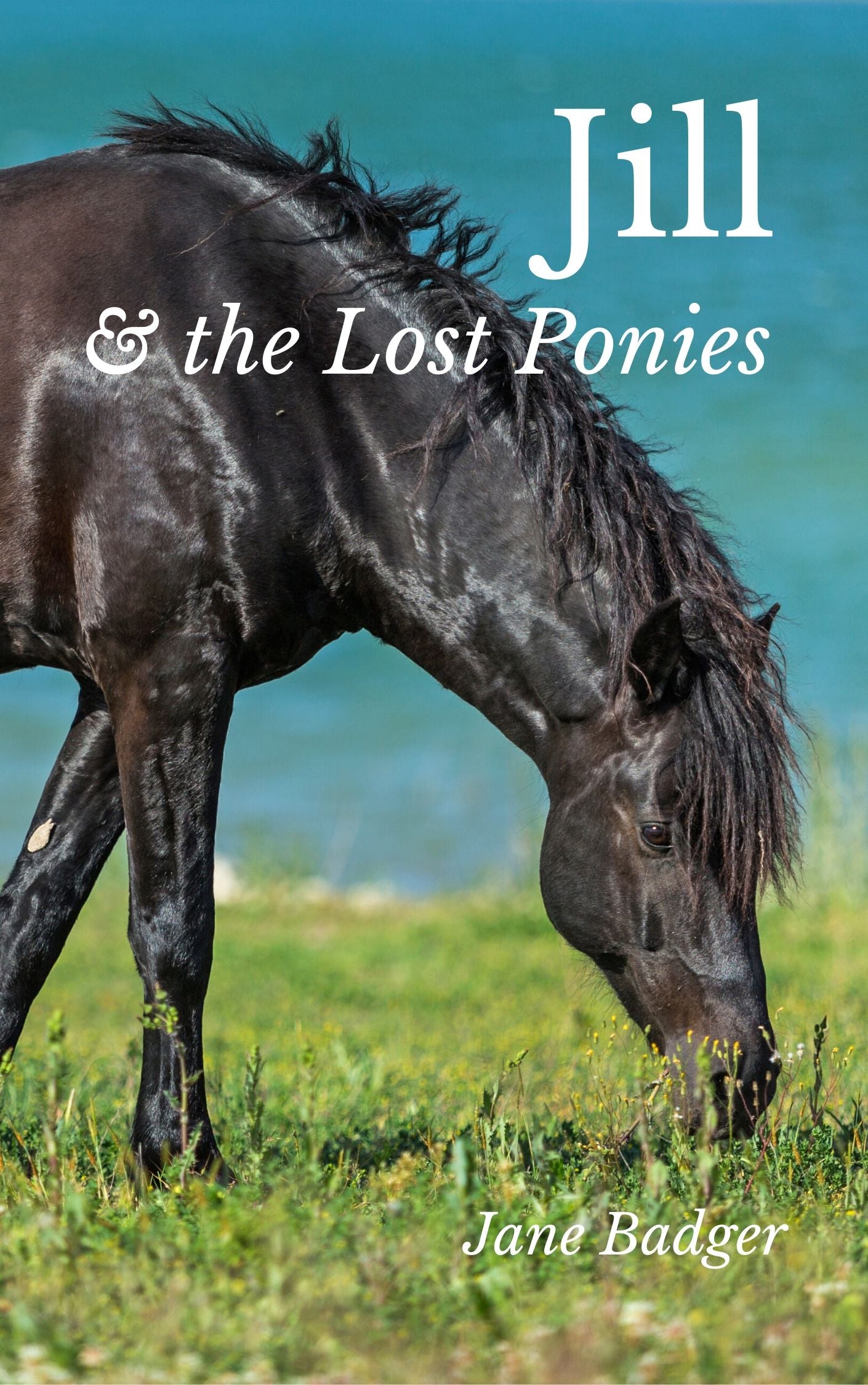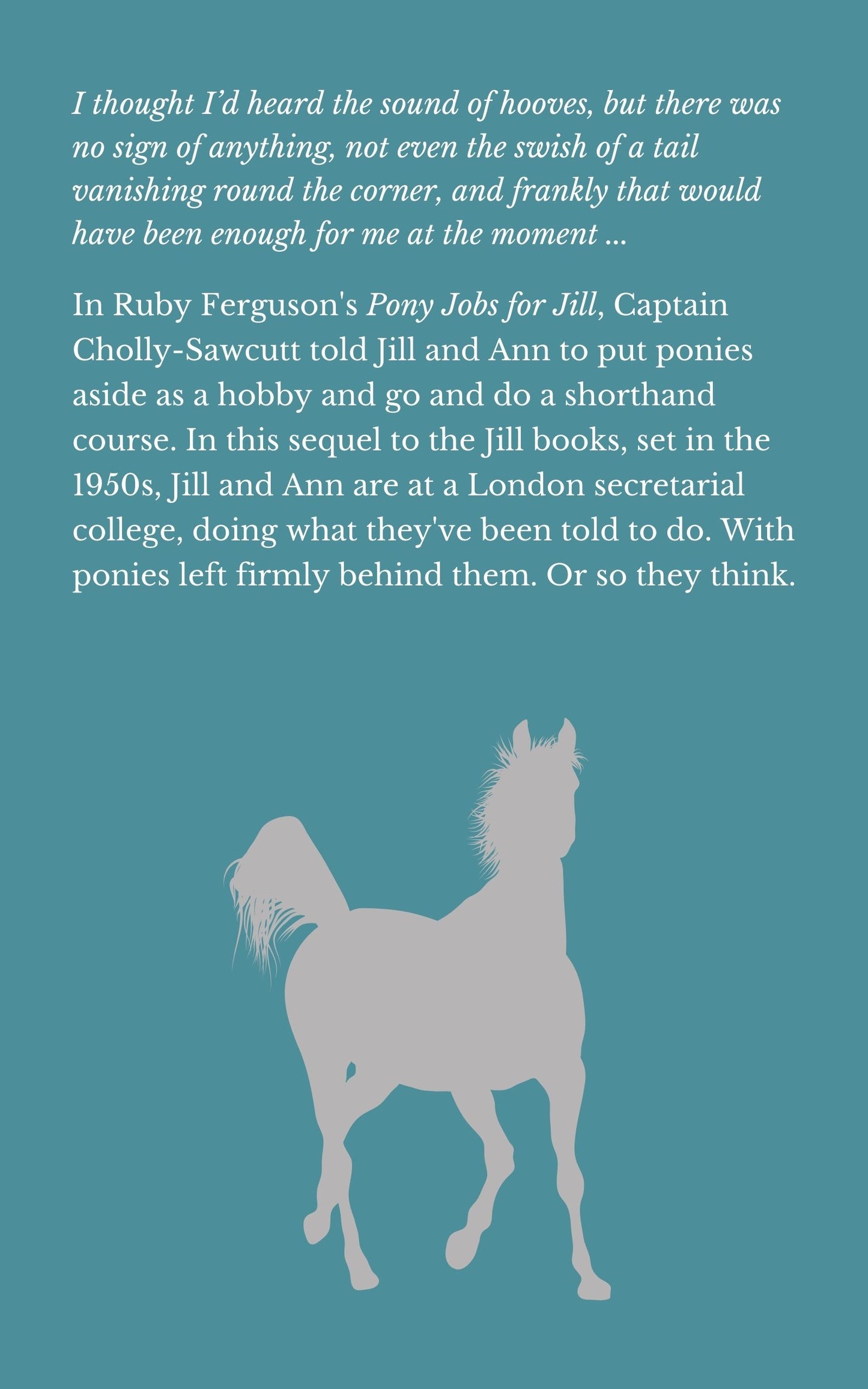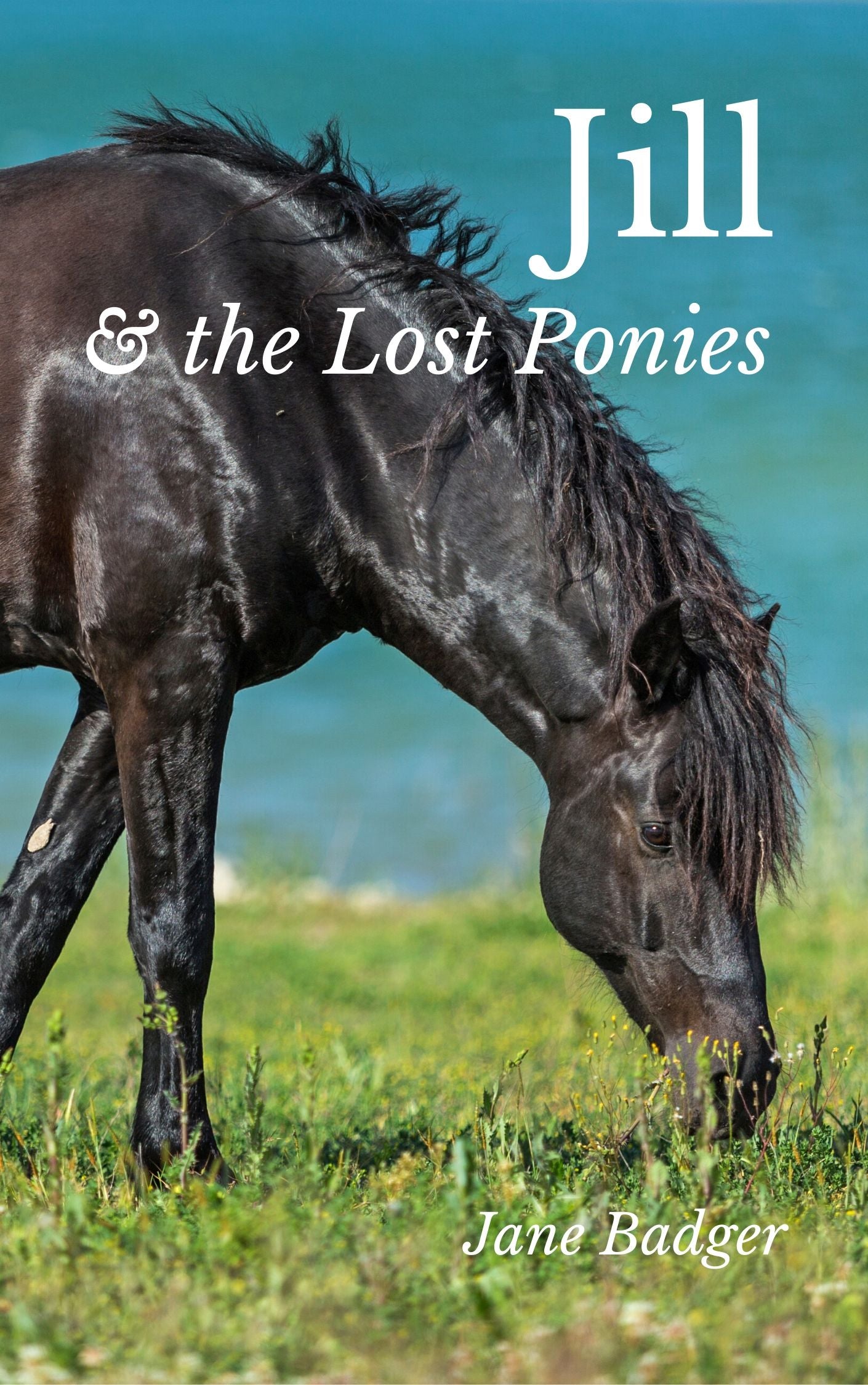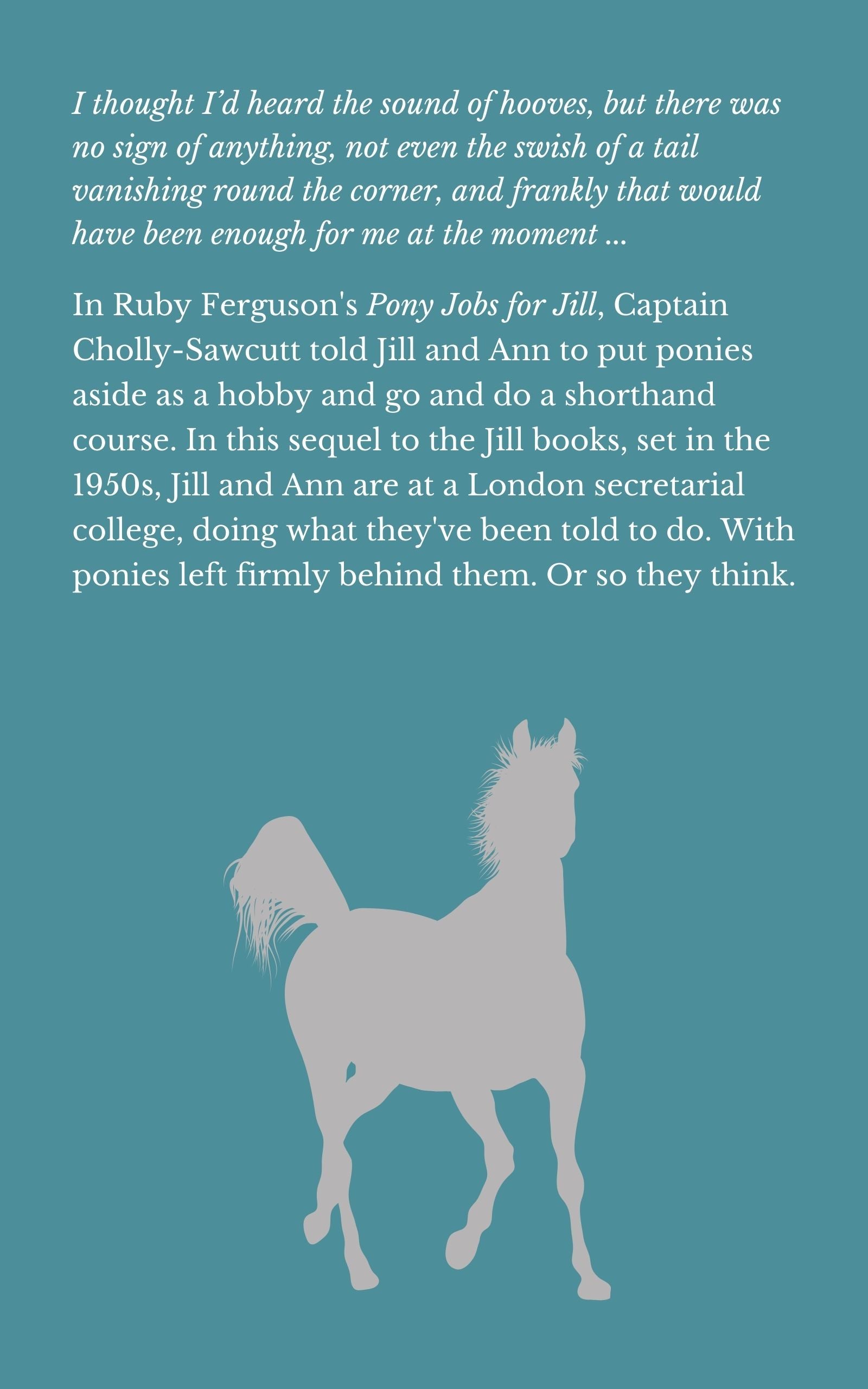Jane Badger Books
Jane Badger: Jill and the Lost Ponies (eBook)
Jane Badger: Jill and the Lost Ponies (eBook)
Couldn't load pickup availability
Share
"I read Jill and the Lost Ponies, and it was brilliant, thank you! It completely brought Jill back. I haven't enjoyed anything that much for a long time." (Helen)
In Ruby Ferguson's Pony Jobs for Jill, Captain Cholly-Sawcutt told Jill and Ann to put ponies aside as a hobby and go and do a shorthand course. I always wondered what would happen if they went off and did just that. And so in this sequel to the Jill books, set in the 1950s, we find Jill and Ann are at a London secretarial college, doing what they've been told to do. With ponies left firmly behind them. Or so they think.
Page length: 162
Original publication date:
How do I get my book?
How do I get my book?
There's a link to download in your confirmation email. If you need help, the email from Bookfunnel, who handle our delivery, will walk you through downloading the file that works best for you.
How do I read my eBook?
How do I read my eBook?
You can read the ebooks on any ereader (Amazon, Kobo, Nook), your tablet, phone, computer, and/or in the free Bookfunnel app.
Read a sample
Read a sample
Last month the view out of my window was our orchard, and my ponies. Now it’s South Kensington in London. I was hanging out of the window that morning because I thought I’d heard the sound of hooves, but there was no sign of anything, not even the swish of a tail vanishing round the corner, and frankly that would have been enough for me at the moment.
South Kensington’s nice enough if you like that sort of thing: it’s all tall white houses and black railings and smart London women and nannies. If you remember my cousin Cecilia from my previous books, you will understand when I say South Kensington is her spiritual home. South Ken is wall-to-wall Cecilias. I’ve never seen so much cashmere and pearls in all my life. There are horses. There are horses in Hyde Park, which I can’t afford to ride. And can’t get anywhere near, either, because when Ann and I had got to London, we’d shot straight off to the local riding stables to offer our services as experienced horsewomen and every one of them had looked at us as if we’d just crawled out from the muck heap.
I leaned out of the window and sighed – one of those deep sighs that come out of your boots.
My ponies, Black Boy and Rapide, were miles away in Chatton. I hadn’t seen them for weeks, because they were now working for their living at Mrs Darcy’s riding school. Ann and I were now lurking at the South Kensington Secretarial College for Girls. Secretarial college seemed such a good idea when Captain Cholly-Sawcutt mentioned it, after Ann and I had done the last of our pony jobs. It didn’t quite come into the category of a beautiful dream, but at the time, there wasn’t a lot else on offer. Mummy was starting to huff a bit about me being under her feet the whole time when she was trying to write, and getting out of the way seemed like a good idea, because after all, I had to do something.
Except no one had told me about shorthand. I had a beautiful golden dream about being the right hand woman of the Prime Minister and taking notes of lots of top secret meetings, and dashing off immaculate letters for the PM and a grateful Cabinet, but the thing is, you need to know shorthand, and shorthand is the utter pits. If you’ve sat there and your nearest and dearest have told you to go off and do shorthand, don’t listen to them. It’s all peculiar squiggles and odd dots you sometimes put somewhere and you sometimes don’t, and it was getting me down.
It was getting Ann down too, because she was quite good at it, and although she’d tried to help me it was hopeless. A fog descended when I even thought about shorthand, and that was that. My life, which had once been filled with horsey adventures, had now become a round of typing, shorthand and secretarial practice.
Ann and I were living at the top of the college. Most of the other girls lived in the college’s hostel in the next street, but Mummy had gone rather pale when she found out how much that would cost, and so I said I’d live in one of the college attics. They were much cheaper, and if you’ve spent quite a lot of your life sleeping in barns and what have you on your adventures, what’s a few bare boards? Ann insisted she’d share with me, even though her mother, Mrs Derry, threatened not to allow her to go at all, because what would people say when they knew she was just perching in the attics instead of living with the other girls?
In the end, Ann got her way when she agreed to take a flower arranging course, which was one of the extras you could do as well as the shorthand and typing. It was one of those funny things that Mrs Derry was really keen on, and after a lot of muttering about Sara Crewe, who’d been shoved into an attic when her father lost his money, and how people would think it was just the same, she caved in.
I hung over the window sill and peered out at the street. Nothing was moving, not even a bird. It’s funny, but in Chatton there was always something making a noise, even if it was just Mummy’s soulless chickens bellowing because they’d laid an egg. In London, sometimes you’d think everything had died. Hanging out of the window reminded me of when I used to do it at home, and see the ponies in the orchard. The last time I’d seen them, they’d trotted off quite happily when I took them up to Mrs Darcy’s, because I took them up there all the time, and they had no idea that this time they wouldn’t be coming back. If you’ve ever waved your ponies off before you headed off to the charnel house that is London, or school, or wherever else your nearest and dearest have decided you needed to be for the good of your future, you will know just how bad I felt. I sighed.
“Buck up, old thing,” said Ann. “We’ve got shorthand with Miss Dodds in a minute.”
We had, and Miss Dodds doesn’t take it terribly well if we’re late. I sighed again, grabbed my shorthand notebook off my bed, and stumbled along behind Ann.
All the shorthand classrooms were on the ground floor of the building, so we sloped down the stairs and into the hall. There were pigeonholes for your post just inside the door, and I leaped on them with a whoop when I recognised Diana Bush’s handwriting. There was a letter from Mummy too.
“What’s up?” asked Ann, when she heard me whoop. I waved the letter from Diana at her.
“I say, that’s terrific,” said Ann. “I’d been wondering how Diana was. Quick, open it now!”
Have you ever had that cold, dread feeling that something awful was going to happen? Well I had it now, and I was right, because like a rocket, Miss Dodds emerged from the shorthand room.
“No letters allowed during class, girls,” she said, and she whisked Diana’s letter out of my hand, just like that.
Fortunately I’d shoved Mummy’s letter into my cardigan pocket. Ann and I pulled despairing faces at each other, and we trailed off into the classroom behind Miss Dodds.
The shorthand lesson was just as bad as I had thought it’d be. In shorthand there are little dots you put in to show you what the vowels are, but Miss Dodds had decided the class was advanced enough now to do without them. I knew, and Miss Dodds knew, that I wasn’t advanced enough to do without the dots, and so she bunged me into a desk at the back of the classroom and told me to read chapter one of the Pitman’s Guide to Shorthand. Honestly, it made me long for school. At least Jane Eyre, which we did in English in my last year, had a story, and she did interesting things, though I couldn’t help but think she was a dope to get in the way of Mr Rochester’s horse and make him fall off. What was she thinking?
After five minutes I’d had enough of drawing the thick and thin lines that you’re supposed to use in shorthand for consonants. Miss Dodds and the rest of the class were doing a speed test. She reads something out and you have to take it down in shorthand and then write down what you’ve written, if you see what I mean. Miss Dodds was concentrating on pacing her reading to forty words a minute, so I edged Mummy’s letter out of my pocket and onto my lap. Fortunately Mummy must have been in a rush, because the envelope was only sealed down at the edge. I slid the letter out and flattened it onto my lap.
My Dear Jill,
This is such a difficult letter for me to write, and I did want to come up and tell you all my news myself, but it simply wasn’t possible, for reasons that I hope you will see. I want you to be brave, Jill, as I know you can be. You know that The Charms of Cosy Cottage hasn’t sold as well as my other books, and my publisher was very worried, as was I, because as you know, it costs a good deal to keep the two of us going. Last week, I had some wonderful news … ”
And that was as far as I got, because I suddenly became aware that someone was saying my name. It was Miss Dodds.
“Are you quite well, dear?” she said. “Because you yelped.”
Well, who wouldn’t have yelped with a letter like that? I was desperate to get back to it, but I knew I didn’t have a chance now. Miss Dodds suggested I come and sit next to Ann so she could keep an eye on me in case I was ill, so I trailed back up the classroom.
“What’s up, you mutt?” hissed Ann, as Miss Dodds turned to the board and started yipping on about hooks, or something like that.
“It’s Mummy,” I hissed back.
“What’s happened?”
“I don’t know,” I said.
“What has happened is that two of my girls appear to have turned into a pair of hissing snakes,” said Miss Dodds.
I mean, what did Miss Dodds expect? Ann and I buckled down until the end of the lesson, when we shot out and down into the basement where there was an ancient kettle we could use to make ourselves tea. I grabbed a stool and uncrumpled the letter from my pocket. I read it through, and then I read it again.
“Ann,” I said. “You’ll never guess what’s happened.”
Who's in the book?
Who's in the book?
Other titles published as
Other titles published as
Series order
Series order


I can’t review as I haven’t received the book …O look in outside shed , porch behind bins etc every day but no go?! Where is it ? feeling rather perplexed😡🥴
I'm sorry about that - I checked your order and that was for an eBook. I've emailed you, so do please let me know if you'd like a refund.
A very fitting sequel to the Jill series. Jane captures Ruby’s humour very well.
Finding a new Jill book 30+ years after reading the series has been amazing and the story so far doesn’t disappoint! I’m savouring a chapter every few days, although I could have read it one sitting!!
Loved it- brilliant!! I loved the Jill books and this sequel has the spirit of Ruby Ferguson’s stories.Took me a while to navigate to my downloaded files but so worth it!


